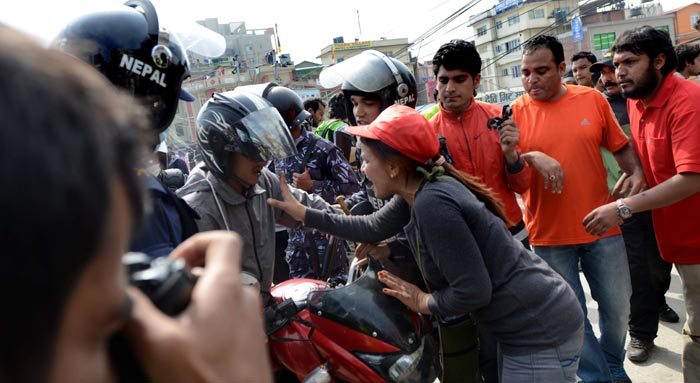Nepalese protesters threaten a motorcyclist for defying a three-day nationwide strike led by the Unified Communist Party of Nepal (Maoist) in Kathmandu on Tuesday.
AFP/Kathmandu
Nepalese police on Tuesday fired tear gas and arrested dozens of demonstrators for trying to enforce a nationwide Maoist-led strike in protest at the government's plan to push through a new constitution.
The opposition forced factories, schools and public transport to shut down across the Himalayan nation in protest at plans to hold a vote on disputed terms of the charter despite a failure to reach cross-party agreement.
Police said scores of security personnel had been deployed in Kathmandu as a 30-party opposition alliance headed by former Maoist rebels began a three-day strike.
Tensions flared in the city as demonstrators tried to attack a police van carrying arrested protesters, local police official Bishwa Raj Pokharel said.
Police arrested more than 50 demonstrators across the country for stopping vehicles, vandalising property and intimidating shopkeepers into shutting down their businesses.
"This morning, a parked taxi was set on fire. In total, 23 vehicles were vandalised, including seven in the capital," said police spokesperson Kamal Singh Bam.
Protestors also vandalised a municipality building in eastern Nepal, breaking furniture and smashing windows, Bam said.
Senior Maoist leader Giriraj Mani Pokharel said the opposition would continue to enforce the strike on Wednesday to try to pile pressure on the government.
"Our protest today has been successful... we will intensify the strike tomorrow," Pokharel said.
Disagreement between parties has led Nepal's lawmakers to miss a series of deadlines to draft a new national constitution, deepening public frustration at the slow pace of political and economic progress after a civil war.
The charter was designed to complete a peace process begun after Maoist guerrillas laid down their arms in 2006, ending a decade-long insurgency.
A key sticking point concerns internal borders, with the opposition pushing for new provinces to be created along lines that could favour historically marginalised communities.
Other parties have attacked this model, calling it too divisive and a threat to national unity.
Many Nepalis on the streets of Kathmandu on Tuesday said they were frustrated by the squabbling over the constitution, but opposed the strike which hurt their livelihoods.
"The politicians don't care about us and our suffering," labourer Maila Chettri, 41, said.
"The rich can survive, but we need to work... now they have called a strike for three days, how will I eat?"

